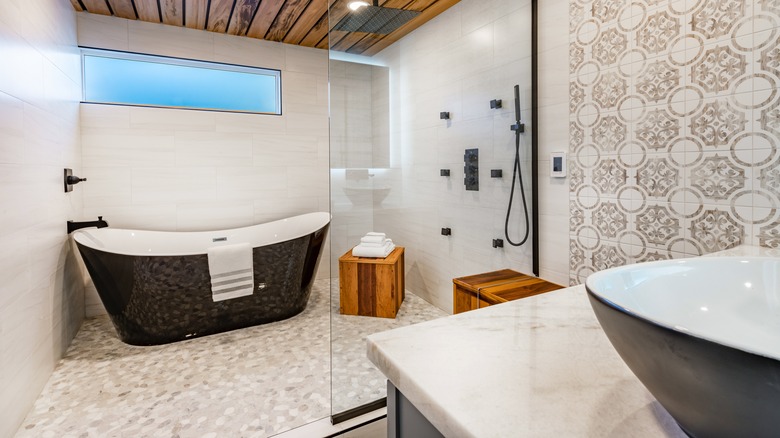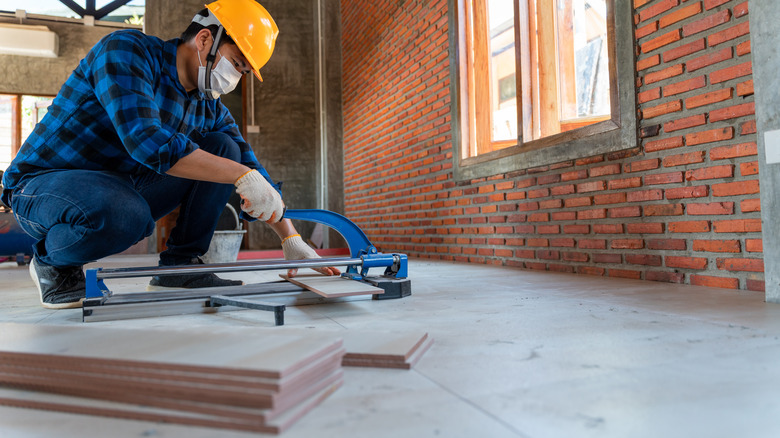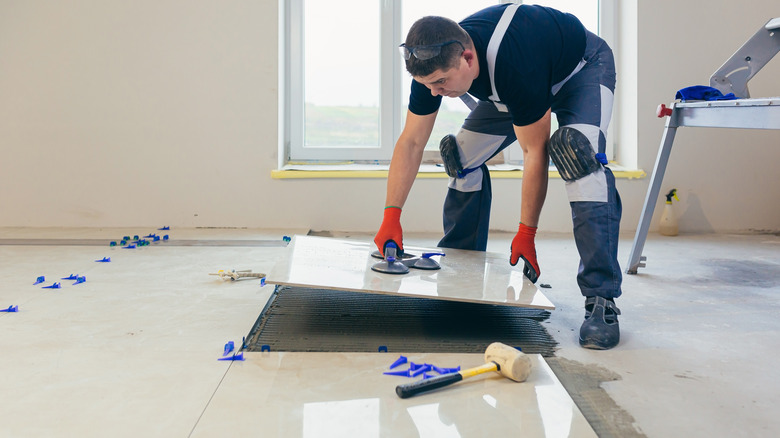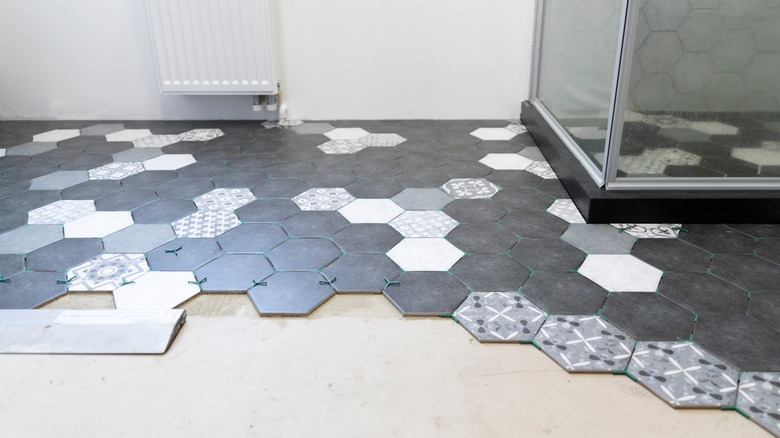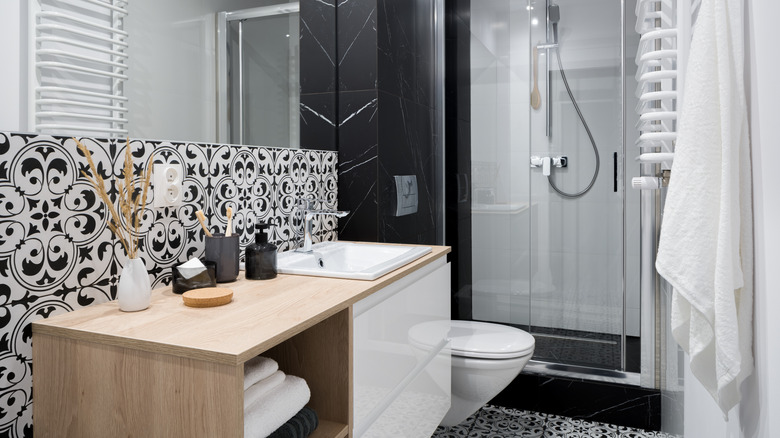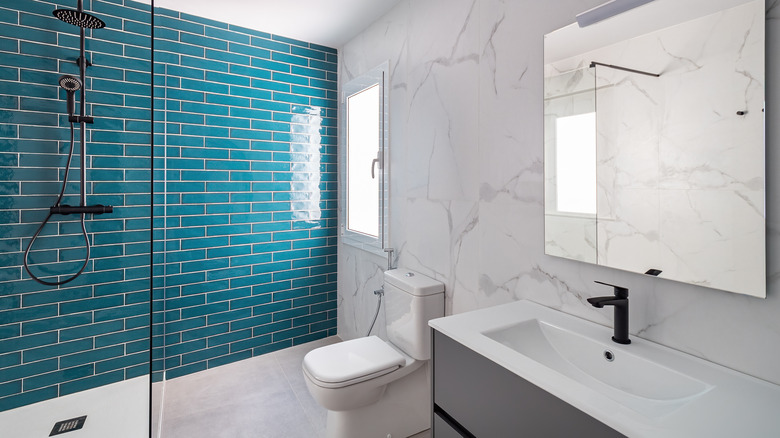How Much Does It Cost To Tile A Bathroom?
Bathroom tiles contribute a big part to the aesthetic appeal and function of a bathroom. They are not only durable but also exist in different shapes and patterns that will give the bathrooms in your home a much-needed makeover. So if you are considering a bathroom renovation, you have to factor in the cost implication of tiling the space. It is worth mentioning that there is no one-fits-all mentality as far as tiling a bathroom is concerned. The fact that there are plenty of tile materials, patterns, sizes, and shapes means that there is something for every budget.
If you are tired of frequent tile repairs and want a full retiling or considering installing tiles to a newly constructed bathroom, you will need to have an actionable plan. According to HomeAdvisor, the average cost of tiling a bathroom ranges between $450 and $1,000, or between $2 and $17 per square foot. Of course, different factors will determine how much your overall quote will be. So let's dig deep into everything you need to know about the cost of tiling a bathroom.
Factors for cost
Again, there are several factors that will either raise or lower the cost of tiling a bathroom. A majority of these aspects have to do with the unique requirement of your home and also the quality of finish you are looking for. Here is a rundown of some of the major factors affecting the cost of tiling a bathroom.
The size of the bathroom
It goes without saying that tiling a larger bathroom will cost more than a smaller space. Since materials and labor are charged by square feet, you can calculate an approximate cost by finding out the overall square foot of your bathroom and multiplying by the price per square foot. However, according to Inch Calculator, it is common for larger projects to have discounted costs for tile installation per square foot. Also, you should keep in mind that some contractors have a set minimum number of square feet that they are willing to undertake.
Type of tile
This is an important cost factor that will significantly determine how deep you will have to dig into your pockets for the installation. There are plenty of bathroom tiles from different materials, and each has a unique price tag. If you are the frugal type and considering a cheaper option, go for the standard tile options that have a lower price than high-end tiles that will cost you an arm and a leg. Real Homes mentions that the average cost of installing bathroom tiles by material ranges from $0.50 to $15. Consider your budget and choose accordingly.
Shape and size
The shape and size of the tiles have a lot to do with the complexity of the installation process. Installing the regular rectangular or square tiles is relatively easier compared to those with custom shapes. Remember, the extra effort that goes into cutting tiles with precision for an overall aesthetic design takes time and will cost you more as far as labor is concerned.
Labor
The cost of labor is often subject to other factors like the complexity of the task and also how large the bathroom is in terms of square feet. You should also be aware that different contractors charge differently for labor; therefore, requesting several quotes from different contractors for price comparison is ideal. On average, the job cost for bathroom tile installation ranges from $600 to $800 (per Angi). Some contractors do charge labor in terms of square footage, though.
Additional costs
The cost implications of installing bathroom tiles go further than the factors mentioned above. There are other unique aspects and customization options that will likely increase the overall expense of the tiling work. Here are some other facets of the tilling process that you should consider when approximating the project's budget.
Tile removal
For a bathroom tile reinstallation, the existing tiles will need to go to give room for the new slabs. Keep in mind that it is not only the old tiles that need to go; the professional will also need to remove the adhesives and grout as well. Therefore, tile removal is an added expense that you will need to factor into your budget. According to Costimates, the price ranges between $1.50 to $4.15 for tile removal per square foot, and it can go even higher depending on the contractor. However, you can save yourself a couple of bucks if you take up the task yourself.
Permits
Permits are not necessary for every home project; however, it is wise to inquire from your local building authorities whether you will need a permit for tiling your bathroom. Homelight notes that permission may be necessary for this renovation project, especially if it involves waterproofing and also other minor plumbing works.
Sealing
According to Tile Club, sealing is only necessary for tiles that are not waterproof. While ceramic tiles are naturally waterproof, you must consider sealing if you choose granite or natural stone for your bathroom. Tiles like natural stone are porous in nature, allowing water to seep through, causing water damage in the long run. Moreover, sealing helps prevent your bright bathroom tiles from staining and leaving ugly unwanted marks behind.
Types of bathroom tiles
Bathroom tile options go beyond the common vinyl preferences. There are a plethora of options from different materials ranging from the basic ceramic to more luxurious options like natural stone or marble. Here is a breakdown of some of the popular choices you have.
Vinyl tiles
Again, vinyl tiles are among the most popular option for most homeowners. They are quite durable and also provide a dependable surface that is equally comfortable on the feet. It is also relatively cheaper, costing from $1.50 to $5, including installation, notes Thumbtack. Vinyl tiles are available in different colors and patterns, making it easy for you to find one that suits your design of choice. It is easy to install and is a good option for anyone considering going the DIY route.
Ceramic tiles
Ceramic tiles are quite versatile and have a variety of applications other than bathroom tiles. If durability and affordability are anything to go by, then ceramic tiles are a good option for any bathroom improvement project. They are water and stain-resistant, requiring less maintenance than other options like natural stone. HomeAdvisor mentions that the cost of ceramic tiles ranges from $0.5 to $15.
Porcelain tiles
This is another relatively cheaper option that is also quite popular. Inch Calculator notes that porcelain tiles cost between $3 to $10 for every square foot purchased. There are two variations when it comes to porcelain tiles; thin and thicker options. The thin options undergo a different process to ensure they are strong enough while remaining thin for convenience. Porcelain tiles are waterproof, stain-resistant, and also easy to clean, making them a good option for bathroom installation.
Natural stone
This is one of the most beautiful options that are available in the market. However, natural stone is also quite expensive, similar to any other luxurious material. A lot of work also goes into cutting it down to custom sizes; therefore, you can expect the installation cost to be high as well. While stone tile is a delight to the eyes after installation, it does come with additional maintenance practices like annual sealing to keep it in tip-top shape and also avoid water damage. According to Inch Calculator, the average cost of natural stone tiles per square foot ranges between $10 and $50.
Why do you need new bathroom tiles?
Depending on the size of your house, putting in new tiles can be a huge investment. However, there are more than enough reasons why you should consider this upgrade.
Improve the home's value
Even before considering putting your home up for sale, installing new tiles will leave your residence looking beautiful, and it is a worthy project for yourself. In the event that you consider selling your place, a simple improvement like installing beautiful tiles is likely to improve your home's value altogether. There is a lot of good that comes with the installation of new bathroom tiles, for instance, aesthetic appeal and durability. Ulta Home Improvements mentions that bathroom improvements can increase the value of a home by up to and over $11,000.
Keep up with interior décor trends
Let's face it; bathroom renovation often comes last, especially when the budget is not on our side. However, your bathroom must keep up with the other modern features in your home as well. Installing new tiles is a good way of keeping the cost down and also giving the bathrooms in your house the renovation they deserve.
Benefits of tiling a bathroom
Like any other home upgrade, installing bathroom tiles has its fair share of advantages you don't want to miss. Right from creating an aesthetically pleasing space for your family to providing a durable and safe surface, you have so much to gain from tiling your bathroom.
Easy maintenance
Cleaning toiletries off a tiled surface is more manageable than wiping similar smudges off a carpeted surface. What's more, cleaning the tiles is as easy as wiping the surface using a cloth and regular home detergents because most slabs are stain-resistant. In addition, HomeAdvisor notes that ceramic tiles are water-resistant, and you don't have to worry about mold and mildew growth that will stain the surface and also pollute indoor air.
Durability
Bathroom tiles are not only beautiful to look at but are also quite durable, needing minimal care and maintenance practices. Ceramic and porcelain, to be particular, have a hard surface that does not chip or crack easily. Also, the grout holding the tile pieces together adds an extra water resistance feature that prevents water damage. As a result, your bathrooms will remain beautiful and pristine for longer than compared to painted bathroom surfaces.
No off-gassing
Some synthetic materials like paint or wood preservatives emit volatile organic compounds that compromise the air quality of your home, according to the United States Environmental Protection Agency (EPA). This is dangerous and can cause health problems for anyone with asthma or sensitive to other allergens. Options like ceramic tiles made of natural materials do not emit such compounds, therefore, keeping your home free from synthetic fumes.
